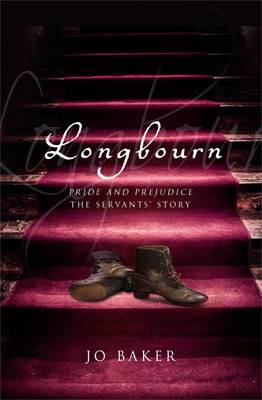Longbourn

Longbourn
If Elizabeth Bennet had the washing of her own petticoats, Sarah thought, she would be more careful not to trudge through muddy fields.
It is wash-day for the housemaids at Longbourn House, and Sarah's hands are chapped and bleeding. Domestic life below stairs, ruled tenderly and forcefully by Mrs Hill the housekeeper, is about to be disturbed by the arrival of a new footman smelling of the sea, and bearing secrets.
For in Georgian England, there is a world the young ladies in the drawing room will never know, a world of poverty, love, and brutal war.
Jo Baker was educated at Oxford and The Queen's University, Belfast. She lives in Lancaster with her husband, the playwright Daragh Carville, and their two children.
Longbourn
Random House Australia
Author: Jo Baker
ISBN: 9780857522023
RRP: $32.95
Interview with Jo Baker
Question: What inspired you to retell Pride and Prejudice from the servants' point of view?
Jo Baker: I'm a massive fan of Jane Austen: I've re-read Pride and Prejudice more times than I can remember. But I've always known that if I'd lived in Austen's day, I wouldn't have got to live like the Bennet girls, I wouldn't have got to go to the ball. My grandma and her sisters were all in service; if I'd lived in Austen's day it's likely I'd have been stuck at home with the housework.
Knowing that perhaps made me more aware of the servants' presence in Pride and Prejudice than I otherwise would have been. I noticed these little flickers of activity that require someone – a servant – to make them happen: the errands that are run, the messages delivered, the meals served. I wanted to know about the people who were doing this – they were, after all, as real as anybody else. I wanted to know what impact the events of Pride and Prejudice had on them. It's perhaps rather pragmatic of me but I wanted to know who washed Elizabeth's petticoats when she got them inches deep in mud…
Question: What research went into Longbourn?
Jo Baker: A lot of reading of course – social and cultural histories, letters, recipes and remedies. There was also – it almost goes without saying – a very close reading of Pride and Prejudice itself, as Longbourn is woven so closely into it: when a meal is served in Austen's novel it has been prepared in mine; when the Bennet girls arrive at a ball in Pride and Prejudice they have left the carriage waiting in Longbourn. I also undertook quite a bit of practical research – trying out some of the old cleaning methods – cleaning my floors with tea, for example.
Question: Why was it important for you to create a unique storyline whilst still retelling Pride and Prejudice?
Jo Baker: I don't really think of Longbourn as a retelling of Pride and Prejudice – Pride and Prejudice doesn't need retelling: it's perfect. I think of Longbourn as uncovering stories buried in the earlier novel: I just happened to be interested in digging for them.
I didn't make a conscious decision that Sarah's story had to be so very different from Elizabeth's; it was an instinctive thing – the story just naturally flowed that way. But I suppose that it stemmed from the understanding that since my main characters belong to the servant class, their experiences – and their stories – are inevitably very different from those of a respectable gentleman's daughter.
Question: When did you first read Pride and Prejudice?
Jo Baker: I actually can't remember. I feel like I've always known it.
Question: How did you go about creating the character of Sarah?
Jo Baker: Sarah's character emerged from a line in Pride and Prejudice.
It's the week before the Netherfield Ball; it has been raining for days, and the roads are awash, the footpaths muddy, and none of the Bennet girls are prepared to venture forth – but they do want new decorations for their dancing shoes. And so -the very shoe-roses for Netherfield were got by proxy'.
I became fascinated by that -proxy' – a maid, I thought; perhaps much the same age as the Bennet girls, but with none of their advantages. I started to wonder what that rainy walk to Meryton felt like for her, what her hopes and fears and wishes and resentments were. Sarah's character began to take shape from there.
MORE





